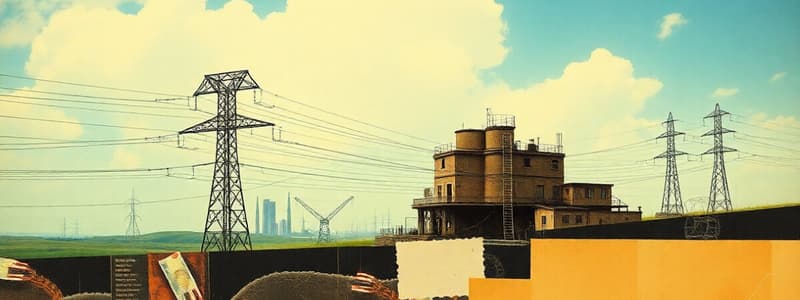Podcast
Questions and Answers
What is a significant advantage of three-phase power for businesses with heavy equipment?
What is a significant advantage of three-phase power for businesses with heavy equipment?
- It is less expensive than single-phase power.
- It requires less maintenance than single-phase systems.
- It operates at a lower voltage output.
- It can deliver higher power capacity. (correct)
How does three-phase power improve efficiency for commercial users?
How does three-phase power improve efficiency for commercial users?
- By providing a more stable and efficient power output. (correct)
- By decreasing the number of phases required for operation.
- By reducing the need for backup generators.
- By increasing the voltage supplied to equipment.
Which of the following is a common industry that benefits from three-phase power?
Which of the following is a common industry that benefits from three-phase power?
- Marketing
- Retail and Warehousing (correct)
- Construction
- Legal Services
What is a practical advantage of three-phase motors compared to single-phase motors?
What is a practical advantage of three-phase motors compared to single-phase motors?
What can be expected of the voltage supplied to three-phase equipment?
What can be expected of the voltage supplied to three-phase equipment?
What does the versatility of three-phase systems allow for?
What does the versatility of three-phase systems allow for?
Which of the following best describes the scalability of three-phase systems?
Which of the following best describes the scalability of three-phase systems?
What is a notable factor contributing to cost savings associated with three-phase power?
What is a notable factor contributing to cost savings associated with three-phase power?
What is typically true for a three-phase panel?
What is typically true for a three-phase panel?
What is the voltage measurement between a hot wire and neutral in a three-phase 208V system?
What is the voltage measurement between a hot wire and neutral in a three-phase 208V system?
Which scenario is a clear indicator of three-phase power during a site visit?
Which scenario is a clear indicator of three-phase power during a site visit?
Which statement about three-phase power is false?
Which statement about three-phase power is false?
Which of these implies benefits associated with three-phase power?
Which of these implies benefits associated with three-phase power?
What does a large industrial air conditioning system typically suggest?
What does a large industrial air conditioning system typically suggest?
What is a potential misconception regarding the use of three-phase power?
What is a potential misconception regarding the use of three-phase power?
During a service check, which voltage reading would confirm the presence of a three-phase system?
During a service check, which voltage reading would confirm the presence of a three-phase system?
What factor contributes to the overall efficiency of three-phase power systems?
What factor contributes to the overall efficiency of three-phase power systems?
Which of these is an advantage specific to three-phase power?
Which of these is an advantage specific to three-phase power?
Which voltage is most commonly used in three-phase systems in the US?
Which voltage is most commonly used in three-phase systems in the US?
What is the relationship between phase-to-neutral voltage and line-to-line voltage in a three-phase system?
What is the relationship between phase-to-neutral voltage and line-to-line voltage in a three-phase system?
Which of the following is NOT an advantage of using three-phase power in commercial settings?
Which of the following is NOT an advantage of using three-phase power in commercial settings?
What feature is essential for three-phase solar installations to ensure grid stability?
What feature is essential for three-phase solar installations to ensure grid stability?
What benefit does Maximum Power Point Tracking (MPPT) provide in commercial solar systems?
What benefit does Maximum Power Point Tracking (MPPT) provide in commercial solar systems?
What is the maximum inverter capacity typically accommodated by three-phase systems in commercial applications?
What is the maximum inverter capacity typically accommodated by three-phase systems in commercial applications?
Which of the following is a common voltage observed between two hot wires in a commercial three-phase system?
Which of the following is a common voltage observed between two hot wires in a commercial three-phase system?
What factor is critical when determining compliance for larger solar installations?
What factor is critical when determining compliance for larger solar installations?
What should you examine to determine if a site has a three-phase power connection?
What should you examine to determine if a site has a three-phase power connection?
Which of the following indicates a potential location for three-phase power connections?
Which of the following indicates a potential location for three-phase power connections?
What is one of the advanced energy management features available in three-phase solar systems?
What is one of the advanced energy management features available in three-phase solar systems?
Which advantage does three-phase power provide concerning voltage stability?
Which advantage does three-phase power provide concerning voltage stability?
In commercial applications, why is three-phase power preferred for charging electric vehicles?
In commercial applications, why is three-phase power preferred for charging electric vehicles?
Flashcards
Higher Power Capacity
Higher Power Capacity
Three-phase power systems offer a significantly higher power capacity compared to single-phase systems, making them ideal for businesses with large power demands.
Improved Efficiency
Improved Efficiency
Three-phase systems provide a more stable and efficient power supply, resulting in reduced energy costs and minimized environmental impact.
Cost Savings
Cost Savings
While initial costs may be higher, the long-term savings from reduced energy consumption and lower maintenance costs make three-phase power a cost-effective choice.
Versatility
Versatility
Signup and view all the flashcards
Smoother Operation
Smoother Operation
Signup and view all the flashcards
Reduced Equipment Size
Reduced Equipment Size
Signup and view all the flashcards
Longer Equipment Lifespan
Longer Equipment Lifespan
Signup and view all the flashcards
Scalability
Scalability
Signup and view all the flashcards
Three-Phase Power
Three-Phase Power
Signup and view all the flashcards
Three-Phase Main Breaker
Three-Phase Main Breaker
Signup and view all the flashcards
Air Conditioner and Three-Phase Connection
Air Conditioner and Three-Phase Connection
Signup and view all the flashcards
Voltage in a Three-Phase System
Voltage in a Three-Phase System
Signup and view all the flashcards
Three-Phase Power Identification
Three-Phase Power Identification
Signup and view all the flashcards
Three-Phase Power for Commercial Buildings
Three-Phase Power for Commercial Buildings
Signup and view all the flashcards
Three-Phase Labeling (L1, L2, L3)
Three-Phase Labeling (L1, L2, L3)
Signup and view all the flashcards
Advantages of Balanced Power Distribution
Advantages of Balanced Power Distribution
Signup and view all the flashcards
Applications of Three-Phase Power
Applications of Three-Phase Power
Signup and view all the flashcards
Voltage Measurements in a Three-Phase System
Voltage Measurements in a Three-Phase System
Signup and view all the flashcards
Line-to-line voltage
Line-to-line voltage
Signup and view all the flashcards
Phase-to-neutral voltage
Phase-to-neutral voltage
Signup and view all the flashcards
Single-phase power
Single-phase power
Signup and view all the flashcards
Solar power
Solar power
Signup and view all the flashcards
Solar inverters
Solar inverters
Signup and view all the flashcards
Maximum Power Point Tracking (MPPT)
Maximum Power Point Tracking (MPPT)
Signup and view all the flashcards
Electrical distribution
Electrical distribution
Signup and view all the flashcards
208V
208V
Signup and view all the flashcards
Neutral voltage
Neutral voltage
Signup and view all the flashcards
Balanced three-phase system
Balanced three-phase system
Signup and view all the flashcards
Unbalanced three-phase system
Unbalanced three-phase system
Signup and view all the flashcards
Main electrical panel
Main electrical panel
Signup and view all the flashcards
Circuit breaker
Circuit breaker
Signup and view all the flashcards
Study Notes
Three-Phase Power: A Guide for Commercial Sales
- Three-phase power uses three alternating currents offset by 120 degrees. This system is more efficient for handling higher power loads than single-phase.
Benefits for Commercial Customers
- Higher Power Capacity: Three-phase delivers significantly more power than single-phase, ideal for heavy equipment and high-power demands.
- Improved Efficiency: Three-phase systems provide stable, efficient power output, lowering energy costs and environmental impact.
- Cost Savings: Despite higher initial costs, three-phase power often saves money through reduced energy use and lower maintenance.
- Versatility: Three-phase systems can easily supply single-phase power when needed, offering flexibility.
Practical Advantages
- Smoother Operation: Constant, uninterrupted power is essential for sensitive equipment and continuous operations.
- Reduced Equipment Size: Three-phase motors are typically smaller and cheaper than equivalent single-phase motors, saving space and initial costs.
- Longer Equipment Lifespan: Reduced vibration in three-phase motors extends machinery lifespan.
- Scalability: Three-phase systems adapt to growing power demands without extensive infrastructure changes.
Industry Applications
- Manufacturing: Powers heavy machines, conveyor belts, industrial heating.
- Data Centers: Supports servers, network equipment, and cooling systems.
- Healthcare: Powers medical equipment and hospital HVAC systems.
- Retail/Warehousing: Enables efficient operations in large facilities.
- Agriculture: Powers irrigation systems and farm machinery.
Voltage Considerations (Three-Phase)
- Distribution Voltage: 480V is typical in the US, with some voltage drop from line losses.
- Utilization Voltage: Actual voltage at the equipment end (after the meter) is usually 460V.
- Nominal Voltage: Three-phase equipment is designed for 460V, with a tolerance of 20V (440V-480V).
- Other Voltages: 208V (commercial buildings), 240V, and 600V (some industrial applications, and in Canada) are also used.
- Line-to-Line Voltage: Typically 1.732 times the phase-to-neutral voltage.
Three-Phase Power and Commercial Solar Installations
- Handle Higher Power Loads: Critical for commercial solar due to larger energy demands.
- Support Large Machinery: Ideal for powering extensive HVAC, elevators, and EV charging.
- Improved Grid Integration: More even power distribution leads to better grid stability and reduced voltage issues.
- Scalability and Cost-Effectiveness: Larger inverters and easier expansions are possible.
- Advanced Energy Management: Real-time monitoring, optimized energy harvest, and load balancing are benefits.
- Regulatory Compliance: Many grid codes require three-phase systems for large-scale solar installations.
Identifying Three-Phase Connections
- Main Electrical Panel Location: Usually near the front of the building or in a utility room.
- Examine Main Circuit Breaker: Three separate switches indicate a three-phase system.
- Count the Hot Wires: Three hot wires are typical; single-phase has only one or two.
- Panel Labeling and Equipment: "Three-Phase" or "3Ø" labels help, or look for large HVAC systems, industrial equipment, or elevators.
- Voltage Measurement (if authorized): Between any two hot wires, one should measure ~208V or ~480V for a three-phase system.
Quiz Questions and Answers
- Q1: What is the phase angle difference between each phase? A1: 120 degrees.
- Q2: Three-phase power is less efficient for large commercial applications? \ A2: False
- Q3: How many hot wires? A3: Three
- Q4: Common voltage between two hot wires? A4: 208V or 480V
- Q5: Which is NOT a benefit? A5: Lower installation costs for small appliances.
- Q6: Three-phase panel main breaker switches? A6: Three
- Q7: Large industrial air conditioning system indicates three-phase? A7: True
- Q8: Typical voltage between hot and neutral in 208V three-phase? A8: 120V
- Q9: Clear indicator of three-phase during site visit? A9: Three large wires entering the main panel.
- Q10: Is three-phase power always necessary? A10: False (Some small commercial buildings use single-phase.)
Studying That Suits You
Use AI to generate personalized quizzes and flashcards to suit your learning preferences.




